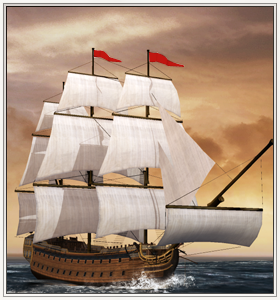Fourth Rate Ship of the Line (ETW Unit)
Overview
Ships of the line of battle are the mainstay of fighting fleets: strong and stable gun platforms for battering enemy vessels into submission. The designation of “fourth rate” for ships of this size is a British Royal Navy one, and covers a number of designs, all with very similar handling and combat power. All fourth rates are square-rigged, two-deck ships, with up to 60 guns on board in a mixture of calibres: usually a mixture of 24-, 18- and 12-pounders, with the heavier guns mounted on the lower deck.
Even though fourth rates are obviously smaller than the third-rate 74s, their firepower is much lower than a simple number-of-guns comparison would indicate. There is no structural strength or space for coping with the recoil of massive guns. As a result, a fourth rate may only have half the weight of fire of a larger ship, although partially it makes up for this by being a handier sailing vessel, especially in shallow waters.
Historically, it was obvious by the 1750s that ships of this size were not tough enough to stand in the line of battle against larger vessels. Over time, various admiralties removed these smaller battle ships from the active service, or sent them to minor stations where they were unlikely to encounter powerful enemies. Some survived as converted transports.
Overview
The first of double-decked ships, fourth rates carry considerably more firepower than fifth rates, at the cost of some of its mobility. Fourth rates are a decent compromise of speed, durability, and firepower, although they are still a little too weak to use as boarding ships and flagships.
